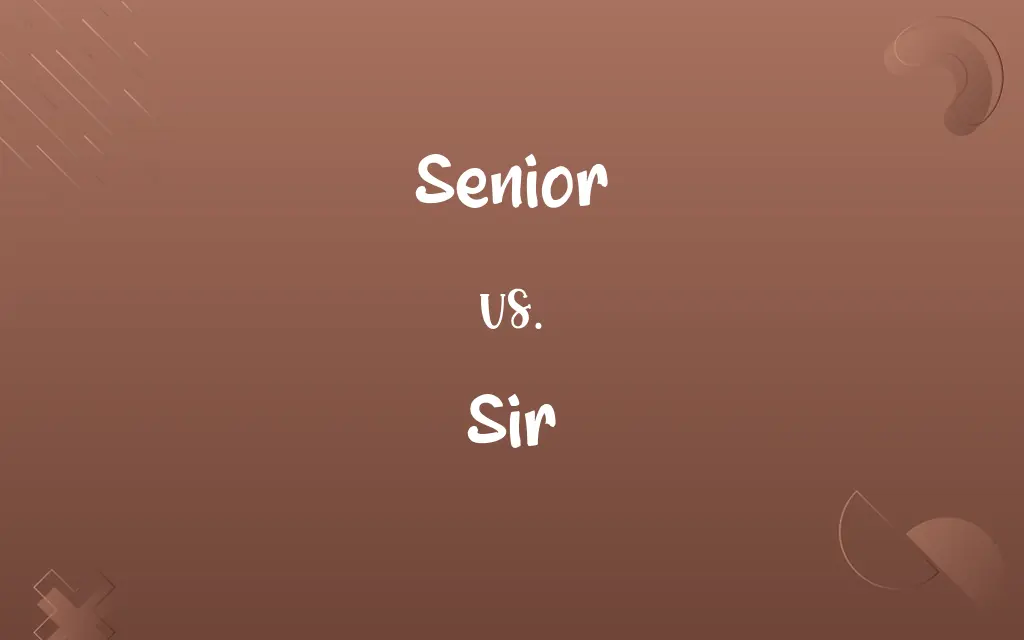Senior vs. Sir: Know the Difference

By Shumaila Saeed & Hifza Nasir || Updated on March 3, 2024
Senior denotes a person's higher rank or age, emphasizing experience or tenure, while Sir is a formal title used to address men, especially knights or baronets.

Key Differences
Senior is often used to signify someone who is older or has a higher position within a hierarchy, reflecting experience or authority. It can apply in various contexts, from family relationships to professional settings, indicating a superior status or longer tenure. Whereas Sir is a formal address for men, traditionally in the context of the British honorage system, it precedes a first name or full name, signifying respect and often nobility or knighthood.
Hifza Nasir
Mar 03, 2024
In academic and professional environments, "senior" can distinguish between individuals with similar names or roles, highlighting experience or seniority. It is commonly appended to job titles or academic standings, such as "senior manager" or "senior student," to denote a higher level of responsibility or advancement. On the other hand, "Sir" is used in social and formal occasions as a polite form of address, not necessarily related to the individual's age or job position but as a mark of respect or acknowledgment of a title.
Shumaila Saeed
Mar 03, 2024
Family dynamics often utilize "senior" to differentiate between generations with shared names, such as fathers and sons, indicating the elder or more senior family member. This usage underscores the term's association with age and precedence. Sir, conversely, is not used for familial distinctions but can be an honor bestowed upon individuals by a sovereign for notable achievements in various fields, reflecting a societal rather than familial hierarchy.
Shumaila Saeed
Mar 03, 2024
In terms of recognition and respect, "senior" can imply a level of expertise, longevity, or precedence in a specific context, suggesting a deserving of deference based on merit or age. Whereas Sir, especially when associated with knighthood or baronetcy, conveys a formalized respect granted through ceremonial recognition, often linked to personal achievements or contributions to the public good.
Shumaila Saeed
Mar 03, 2024
"Senior" carries a broad applicability, serving as a functional descriptor across diverse settings to indicate higher status, age, or experience. It is a term of comparison, relative to peers or counterparts. In contrast, "Sir" is steeped in tradition and formalities, closely tied to British customs and the honor system, representing a specific form of address that transcends mere occupational or familial seniority.
Hifza Nasir
Mar 03, 2024
ADVERTISEMENT
Comparison Chart
Definition
Denotes higher rank or age
A formal title for men, especially knights
Hifza Nasir
Mar 03, 2024
Significance
Experience, authority, precedence
Respect, nobility, knighthood
Shumaila Saeed
Mar 03, 2024
Cultural Association
Broad, across various settings
British tradition, honor system
Shumaila Saeed
Mar 03, 2024
ADVERTISEMENT
Senior and Sir Definitions
Sir
A title granted by a monarch.
He was knighted and became Sir Paul McCartney.
Shumaila Saeed
Mar 03, 2024
Senior
Higher in position or rank.
He was promoted to senior manager last month.
Hifza Nasir
Mar 03, 2024
Sir
Employed in educational settings by students addressing male teachers.
Sir, may I ask a question?
Shumaila Saeed
Mar 03, 2024
Senior
Indicating advanced level or status.
She is a senior editor at the publishing house.
Shumaila Saeed
Mar 03, 2024
ADVERTISEMENT
Sir
A formal title for knights and baronets.
Sir Isaac Newton contributed immensely to physics.
Dua Fatima
Mar 03, 2024
Senior
Used to differentiate between individuals with the same name.
John Doe Senior passed on the business to his son.
Hifza Nasir
Mar 03, 2024
Sir
Used to address men in a respectful manner.
Excuse me, Sir, you dropped your wallet.
Shumaila Saeed
Mar 03, 2024
Senior
Reflecting greater experience or tenure.
As the senior member of the team, she mentors the new hires.
Shumaila Saeed
Mar 03, 2024
Sir
Prefixed to a name in formal correspondence.
The letter was addressed to Sir Julian Smith.
Hifza Nasir
Mar 03, 2024
Sir
Sir Used as an honorific before the given name or the full name of baronets and knights.
Shumaila Saeed
Oct 19, 2023
Senior
Being in a position, rank, or grade above others of the same set or class
A senior officer.
The senior ship in the battle group.
Shumaila Saeed
Oct 19, 2023
Senior
Of or relating to the fourth and last year of high school or college
Our senior class.
Shumaila Saeed
Oct 19, 2023
Sir
A respectful term of address to a man of higher rank or position, particularly:
Shumaila Saeed
Oct 19, 2023
Sir
To a knight or other low member of the peerage.
Just be careful. He gets whingy now if you don't address him as Sir John.
Shumaila Saeed
Oct 19, 2023
Senior
One that is of a higher position, rank, or grade than another in the same set or class.
Shumaila Saeed
Oct 19, 2023
Senior
Someone older than someone else (with possessive).
He was four years her senior.
Shumaila Saeed
Oct 19, 2023
Sir
A respectful term of address to an adult male (often older), especially if his name or proper title is unknown.
Excuse me, sir, do you know the way to the art museum?
Shumaila Saeed
Oct 19, 2023
Sir
A man of social authority and dignity; a lord; a master; a gentleman; - in this sense usually spelled sire.
He was crowned lord and sire.
In the election of a sir so rare.
Shumaila Saeed
Oct 19, 2023
Sir
A respectful title, used in addressing a man, without being prefixed to his name; - used especially in speaking to elders or superiors; sometimes, also, used in the way of emphatic formality.
Shumaila Saeed
Oct 19, 2023
Repeatedly Asked Queries
Can "senior" be used for both men and women?
Yes, "senior" is gender-neutral and can be used for both men and women to denote higher rank or age.
Shumaila Saeed
Mar 03, 2024
Does "senior" imply respect?
While "senior" implies respect through experience or tenure, it is more a descriptor of status than a formal title of respect like "Sir."
Shumaila Saeed
Mar 03, 2024
What is the main difference between Senior and Sir?
Senior refers to higher rank or age, indicating experience or tenure, while Sir is a formal title for men, signifying respect and often linked to knighthood.
Hifza Nasir
Mar 03, 2024
Are there female equivalents to "Sir"?
Yes, the female equivalent to "Sir" is "Dame" for women who have been knighted or granted a similar honor.
Shumaila Saeed
Mar 03, 2024
Do all knights become "Sirs"?
Yes, in the British honours system, knighthood confers the title "Sir" before the recipient's name.
Dua Fatima
Mar 03, 2024
Is "Sir" used in everyday conversation?
"Sir" is used in formal or respectful contexts, such as addressing strangers, teachers, or individuals in positions of authority.
Hifza Nasir
Mar 03, 2024
Is "Sir" a permanent title?
Yes, once granted, "Sir" is a lifelong title unless it is revoked by the Crown under exceptional circumstances.
Shumaila Saeed
Mar 03, 2024
Is "Sir" only used in the United Kingdom?
While "Sir" is rooted in British tradition, it is recognized and used in various countries, especially those with historical ties to the UK.
Shumaila Saeed
Mar 03, 2024
Can "senior" also indicate a person's level in education?
Yes, "senior" can refer to someone in their final year of high school or college, indicating their advanced level within the academic institution.
Shumaila Saeed
Mar 03, 2024
How does one become a "Sir"?
Becoming a "Sir" typically involves being knighted by the monarch of the United Kingdom, often for notable contributions to society or national achievements.
Hifza Nasir
Mar 03, 2024
Can anyone be called "Senior"?
"Senior" is used contextually, often related to someone's position, age, or in familial settings to distinguish between generations.
Shumaila Saeed
Mar 03, 2024
Share this page
Link for your blog / website
HTML
Link to share via messenger
About Author
Written by
Shumaila SaeedShumaila Saeed, an expert content creator with 6 years of experience, specializes in distilling complex topics into easily digestible comparisons, shining a light on the nuances that both inform and educate readers with clarity and accuracy.
Co-written by
Hifza Nasir








































































